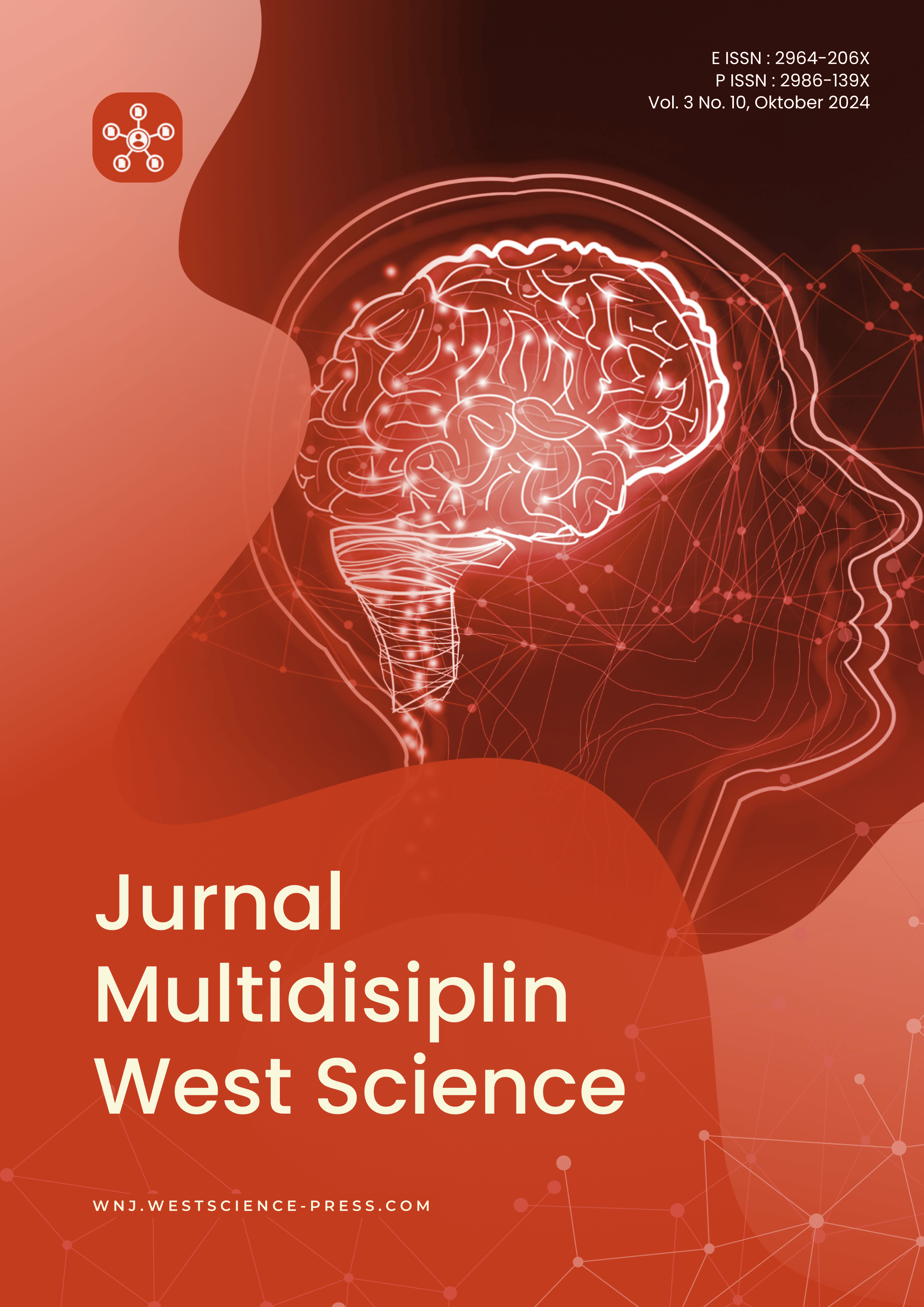Implikasi Desentralisasi terhadap Partisipasi Masyarakat dalam Pembangunan Sosial Ekonomi: Tinjauan Bibliometrik
DOI:
https://doi.org/10.58812/jmws.v3i10.1672Kata Kunci:
Desentralisasi, Pemerintah Lokal, Kesehatan Publik, Partisipasi Masyarakat, Sosial-Ekonomi, Analisis BibliometrikAbstrak
Desentralisasi telah lama diakui sebagai strategi penting dalam pengelolaan pemerintahan dan pembangunan yang efektif. Dengan memperkenalkan lebih banyak otonomi pada tingkat lokal, desentralisasi berpotensi meningkatkan keberhasilan pengelolaan kesehatan publik, pengembangan sosial ekonomi, dan penerapan praktik-praktik pembangunan berkelanjutan. Melalui analisis bibliometrik menggunakan VOSviewer, studi ini mengeksplorasi bagaimana konsep desentralisasi diintegrasikan dalam literatur ilmiah, dengan fokus pada hubungannya dengan pemerintahan lokal, kesehatan publik, dan pembangunan berkelanjutan. Hasil analisis menunjukkan bahwa desentralisasi sangat terkait dengan peningkatan partisipasi dan responsivitas dalam pemerintahan lokal, serta memiliki hubungan yang signifikan dengan pengelolaan kesehatan dan praktik pembangunan yang berkelanjutan. Meskipun desentralisasi menawarkan banyak manfaat, terdapat tantangan dalam penerapannya yang memerlukan perancangan kebijakan yang cermat dan adaptasi terhadap konteks lokal. Studi ini menyimpulkan bahwa integrasi desentralisasi dalam kebijakan dan praktek pengembangan masyarakat dapat secara substansial meningkatkan efektivitas pengelolaan sumber daya dan pelayanan publik, dengan beberapa rekomendasi untuk penelitian masa depan yang lebih mendalam.
Referensi
Andersson, K. P., & Ostrom, E. (2008). Analyzing decentralized resource regimes from a polycentric perspective. Policy Sciences, 41, 71–93.
Annear, M., Keeling, S., Wilkinson, T. I. M., Cushman, G., Gidlow, B. O. B., & Hopkins, H. (2014). Environmental influences on healthy and active ageing: A systematic review. Ageing & Society, 34(4), 590–622.
Aria, M., & Cuccurullo, C. (2017). bibliometrix: An R-tool for comprehensive science mapping analysis. Journal of Informetrics, 11(4), 959–975.
Bardhan, P. (2002). Decentralization of governance and development. Journal of Economic Perspectives, 16(4), 185–205.
Blair, H. (2000). Participation and accountability at the periphery: Democratic local governance in six countries. World Development, 28(1), 21–39.
Caddy, J. F. (1999). Fisheries management in the twenty-first century: will new paradigms apply? Reviews in Fish Biology and Fisheries, 9, 1–43.
Cheema, G. S., & Rondinelli, D. A. (2007). Decentralizing governance: emerging concepts and practices.
Cohen, J. M., & Peterson, S. B. (1999). Administrative decentralization: Strategies for developing countries. (No Title).
Faguet, J.-P. (2004). Does decentralization increase government responsiveness to local needs?: Evidence from Bolivia. Journal of Public Economics, 88(3–4), 867–893.
Gilberthorpe, E., & Banks, G. (2012). Development on whose terms?: CSR discourse and social realities in Papua New Guinea’s extractive industries sector. Resources Policy, 37(2), 185–193.
Koirala, B. P., Araghi, Y., Kroesen, M., Ghorbani, A., Hakvoort, R. A., & Herder, P. M. (2018). Trust, awareness, and independence: Insights from a socio-psychological factor analysis of citizen knowledge and participation in community energy systems. Energy Research & Social Science, 38, 33–40.
Manor, J. (1999). The political economy of democratic decentralization. The World Bank.
Mehta, J. N., & Kellert, S. R. (1998). Local attitudes toward community-based conservation policy and programmes in Nepal: a case study in the Makalu-Barun Conservation Area. Environmental Conservation, 25(4), 320–333.
Napier, A. D., Ancarno, C., Butler, B., Calabrese, J., Chater, A., Chatterjee, H., Guesnet, F., Horne, R., Jacyna, S., & Jadhav, S. (2014). Culture and health. The Lancet, 384(9954), 1607–1639.
Nyaupane, G. P., Morais, D. B., & Dowler, L. (2006). The role of community involvement and number/type of visitors on tourism impacts: A controlled comparison of Annapurna, Nepal and Northwest Yunnan, China. Tourism Management, 27(6), 1373–1385.
Oates, J. F. (1999). Myth and reality in the rain forest: how conservation strategies are failing in West Africa. Univ of California Press.
Oates, W. E. (2004). An essay on fiscal federalism. In Environmental Policy and Fiscal Federalism (pp. 384–414). Edward Elgar Publishing.
Ribot, J. C. (2004). Waiting for democracy. World Resources Institute, Washington, DC, USA.
RIBOT, J. C. (2004). Waiting for Democracy: The Politics of Choice in Natural Resource Decentralization. World Resource Institute Report. Http://Www. Wri. Org/Publication/Waiting-Democracy-Politics-Choice-Natural-Resource-Decentralization.
Rodríguez-Pose, A. (2008). The rise of the “city-region” concept and its development policy implications. European Planning Studies, 16(8), 1025–1046.
Smith, M. D., & Floro, M. S. (2021). The effects of domestic and international remittances on food insecurity in low-and middle-income countries. The Journal of Development Studies, 57(7), 1198–1220.
Smoke, P. (2015). Rethinking decentralization: Assessing challenges to a popular public sector reform. Public Administration and Development, 35(2), 97–112.
Sørensen, K., Van den Broucke, S., Pelikan, J. M., Fullam, J., Doyle, G., Slonska, Z., Kondilis, B., Stoffels, V., Osborne, R. H., & Brand, H. (2013). Measuring health literacy in populations: illuminating the design and development process of the European Health Literacy Survey Questionnaire (HLS-EU-Q). BMC Public Health, 13, 1–10.
Treisman, D. (2007). What have we learned about the causes of corruption from ten years of cross-national empirical research? Annu. Rev. Polit. Sci., 10(1), 211–244.
Utzinger, J., Zhou, X.-N., Chen, M.-G., & Bergquist, R. (2005). Conquering schistosomiasis in China: the long march. Acta Trop, 96(2–3), 69–96.
Van Brakel, W. H., Sihombing, B., Djarir, H., Beise, K., Kusumawardhani, L., Yulihane, R., Kurniasari, I., Kasim, M., Kesumaningsih, K. I., & Wilder-Smith, A. (2012). Disability in people affected by leprosy: the role of impairment, activity, social participation, stigma and discrimination. Global Health Action, 5(1), 18394.
Unduhan
Diterbitkan
Cara Mengutip
Terbitan
Bagian
Lisensi
Hak Cipta (c) 2024 Loso Judijanto, Adi Suroso, Egidius Fkun

Artikel ini berlisensiCreative Commons Attribution-ShareAlike 4.0 International License.



















 Instagram
Instagram 